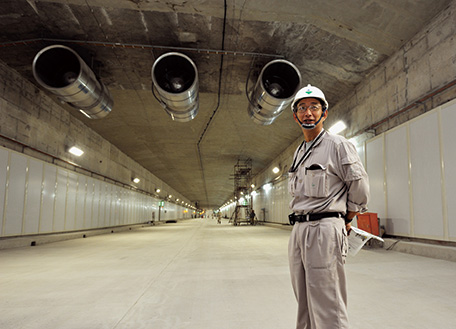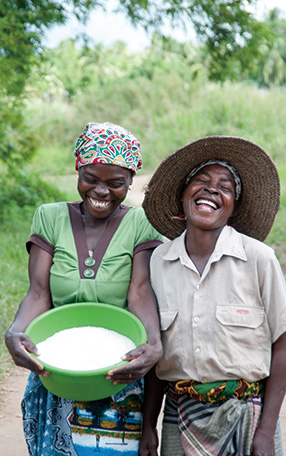Japan's Official Development Assistance White Paper 2012
Chapter 2 ODA for Growing Together

Project Manager Masao Hagiwara of the Obayashi Corporation explains the Saigon East-West Highway Construction Project in the tunnel portion of the road under the Saigon River. (Photo: Koji Sato/JICA)
Section 1 Inflow of Private Capital and Growth in Developing Countries
Poverty, starvation, infectious disease, climate change, and natural disasters are some of the many serious problems faced by developing countries. Since overcoming these problems requires substantial financial resources, it is difficult to meet these needs with ODA alone. It is necessary to meet financial needs using diverse financial resources, and it is expected that private capital will play an important role in this. In recent years, the flow of private capital into developing countries has increased greatly, accounting for 70% of the funds going to these countries. Private capital for developing countries from DAC member countries amounted to $322.3 billion in 2011, which is twice the total ODA amount ($134 billion amount) of DAC member countries for the same year.
For effective development in developing countries, the role of the private sector is very important. Foreign direct investment is used not only as financing for developing countries, but also to transfer technology, knowledge, and experience. This leads to the strengthening of domestic industry and increased employment. As the world economy continues to globalize, if foreign direct investment increases, access to international markets and international competitiveness also increases, demonstrating the large role it plays in the growth of developing countries.
In order to bring in private investments, it is essential to have stable political climate, a legal/judicial system with a high level of integrity to make corporate activities possible, and a developed infrastructure that will be the foundation of these activities. Thus far, Japan has proactively provided cooperation for developing infrastructure and building up the trade and investment environment in developing countries, with the hope of promoting private investment. Particularly in Asia, economic infrastructure developed through Japan’s ODA has acted as a catalyst in furthering private investments, and as a result, a high level of economic growth has been achieved.
In Africa, although political instability and a lack of infrastructure in some countries have been limiting factors, its potential as a market and source of natural resources is widely recognized. Interest in Africa by the private sector continues to increase. Through the framework of the Tokyo International Conference on African Development (TICAD), Japan has also supported the private sector’s lead on economic growth in Africa. Additionally, at the G8 summit held in 2012, the New Alliance for Food Security and Nutrition was committed to launch as a new initiative for improving these areas in sub-Saharan Africa. This alliance leverages the vitality and technological innovation of the private sector to expand the African economy through their agricultural growth.
By developing infrastructure and the trade and investment environment through the use of ODA in this way, constraints on corporate activities in developing countries are eased while costs and risks associated with investments are lowered, consequently promoting the activities of the private sector. This close tie-up of ODA and private capital is thus beneficial for all three of the concerned parties – developing countries, donor countries, and the private sector. The manifestation of the synergy created between ODA and private capital will more efficiently bring about a high level of economic growth in developing countries. Additionally, private companies, including those from Japan, can readily expand their operations overseas, widening the potential for new business.

Local farmers in Zambezia Province in Mozambique carry newly harvested rice. Japan is working in cooperation with Viet Nam on the triangular cooperation. Project for Improvement of Techniques for Increasing Rice Cultivation Productivity (See column) (Photo: Mika Tanimoto/JICA)
